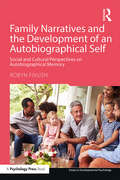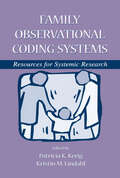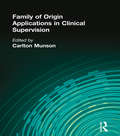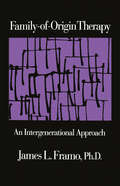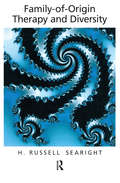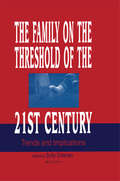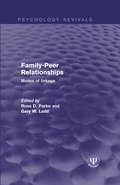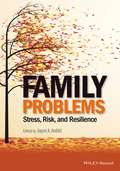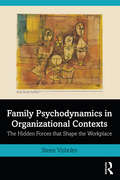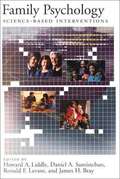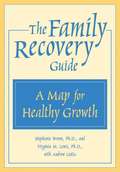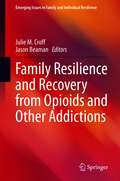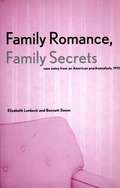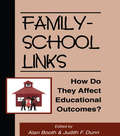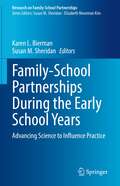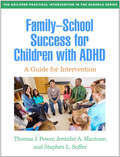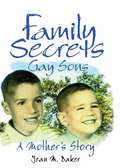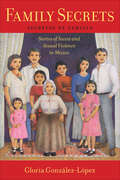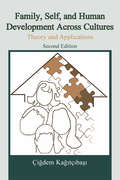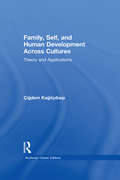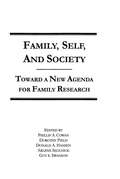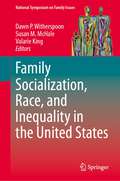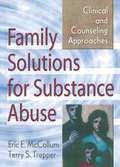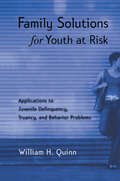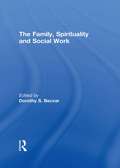- Table View
- List View
Family Narratives and the Development of an Autobiographical Self: Social and Cultural Perspectives on Autobiographical Memory (Essays in Developmental Psychology)
by Robyn FivushStories are central to our world. We form our families, our communities, and our nations through stories. It is through stories of our everyday experiences that each of us constructs an autobiographical self, a narrative identity, that confers a sense of coherence and meaning to our individual lives. In this volume, Robyn Fivush describes how this deeply personal autobiographical self is socially and culturally constructed. Family Narratives and the Development of an Autobiographical Self demonstrates that, through participating in family reminiscing, in which adults help children learn the forms and functions of talking about the past, young children come to understand and evaluate their experiences, and create a sense of self defined through individual and family stories that provide an anchor for understanding self, others, and the world. Fivush draws on three decades of research, from her own lab and from others, to demonstrate the critical role that family stories and family storytelling play in child development and outcome. This volume is essential reading for students and researchers interested in psychology, human development, and family studies.
Family Observational Coding Systems: Resources for Systemic Research
by Patricia K. Kerig Kristin M. LindahlCODING MANUAL INFORMATION IS AVAILABLE FROM THE CHAPTER AUTHORS, AND THEIR E-MAIL ADDRESSES CAN BE FOUND ON PAGE XV OF THE BOOK.Family studies is an area that has enjoyed the benefits of conceptual and methodological advances in recent years including the widespread adoption of observational research techniques. The selection of an appropriate coding system is critical to achieving a better understanding of the complex family processes related to normative and pathological development. This book presents 14 examples of family observational coding systems, chosen for the wide range of constructs and phenomena they capture. Each system is described in detail, and excerpts from the coding manual are presented (links to the full coding manuals are available to purchasers of the book at LEA's Web site, www.erlbaum.com). Each chapter follows a consistent outline, so that the different coding systems can be more easily compared to one another. They include the theoretical underpinnings of the measure, its reliability and validity, the coding process, strategies for coder training, and examples of studies in which it has been used. This volume will prove invaluable to students and researchers in family studies, clinicians, and other practitioners who need to interpret data from family observations.
Family of Origin Applications in Clinical Supervision
by Carlton MunsonImportant, ready-to-use facts on the use of family of origin applications in clinical supervision practice.
Family-Of-Origin Therapy: An Intergenerational Approach
by James L. FramoFirst published in 1993. Routledge is an imprint of Taylor & Francis, an informa company.
Family Of Origin Therapy And Cultural Diversity
by H. Russell SearightFirst published in 1997. Routledge is an imprint of Taylor & Francis, an informa company.
The Family on the Threshold of the 21st Century: Trends and Implications
by Solly DremanIs there life for the family in the 21st century? Pessimists view the traditional two-parent nuclear family as a relic of the past, attributing their gloomy outlook to increased demands from the workplace, rampant technological advancement, and the pursuit of personal achievement at the expense of interpersonal needs and values. Optimists, on the other hand, claim that increasing alienation and emphasis on the occupational sphere necessitate a sense of family, community, and belonging as a haven from work-related stress. This volume addresses these and related issues such as the interplay of personal versus interpersonal factors in family development, the role of the extended family, and the interface between work, community and family. The contents of this book--scholarly contributions from a unique interdisciplinary rostrum of behavioral scientists in such diverse fields as psychology, sociology, anthropology, social work, industrial management, and demography--represent the latest developments in research, theory, and practice in family studies. The reader is presented with theoretical formulations, empirical findings, and applied interventions regarding family life in different parts of the world. A systems perspective is adopted as the family is examined at its interface with individuals, community, society, and culture, with the interdependence of these different levels emphasized. In addition, an attempt is made to integrate the work of theoreticians, researchers, and practitioners in understanding the evolving family. Dreman provides a survey of family life in the international arena and finds a surprising consensus between the different disciplinary perspectives and the respective geographical arenas. He discusses life-span issues in relation to all levels of family life including the impact of increased longevity and decreased fertility in relation to topics such as individual development, parent-child and couple relationships, the workplace, and the community. This book also highlights the interplay of biological and interpersonal dynamics as in the case of spousal depression.
Family-Peer Relationships: Modes of Linkage (Psychology Revivals)
by Ross D. Parke Gary W. LaddOriginally published in 1992, this volume provided an up-to-date overview of recent research concerning the links between family and peer systems. Considerable work in the past had focused on family issues or peer relationships, but these systems had typically been considered separately. This volume bridges the gap across these two important socialization contexts and provides insights into the processes that account for the links across the systems – the ways in which the relationships between these systems shift across development. In addition, the variations in the links between family and peers are illustrated by cross-cultural work, studies of abused children, and research on the impact of maternal depression. In short, the volume provides not only a convenient overview of recent progress at the time but lays out an agenda for future research.
Family Problems: Stress, Risk, and Resilience
by Joyce A. ArdittiFamily Problems: Stress, Risk, and Resilience presents an interdisciplinary collection of original essays that push the boundaries of family science to reflect the increasingly diverse complexity of family concerns in the modern world. Represents the most up-to-date family problem research while addressing such contemporary issues as parental incarceration, same sex marriage, health care disparities, and welfare reform. Features brief chapter introductions that provide context and direction to guide the student to the heart of what’s important in the piece that follows. Includes critical thinking questions to enhance the utility of the book for classroom use. Responds to family problem issues through the lens of a social justice perspective.
Family Psychodynamics in Organizational Contexts: The Hidden Forces that Shape the Workplace
by Steen VisholmThis fascinating book shows how an understanding of the psychodynamics of the extended family, from parental relations to sibling rivalries, can provide insight into many of the key issues faced by organizations today. Covering topics such as change management, creativity, autonomous groups, leadership and democracy, it shows how deep-rooted family dynamics unconsciously frame the way we relate to each other in the workplace, and how they can have a profound influence on the broader trajectory of organizations. This book features: Examples on how to use the extended family as a framework for understanding organizational behaviour. A look beyond parental relationships to discuss sibling relationships as well. Examples to illustrate key topics of practical relevance to consultants and managers. Family Psychodynamics in Organizational Contexts is an important read for students and scholars of organizational psychology, organizational studies and psychodynamics, as well as consultants and coaches working in organizational contexts.
Family Psychology: Science-Based Interventions
by Howard A. Liddle Daniel A. Santisteban Ronald F. Levant James H. BrayThe editors provide a thorough and concise historical overview of the science of family intervention, which is considered the applied branch of family psychology.
The Family Recovery Guide: A Map For Healthy Growth
by Stephanie Brown Virginia M. Lewis Andrew Liotta Jane E. LewisWritten by two specialists and based on the latest research, this book teaches family members how to sustain their relationships during a loved one's recovery from addiction and offers families specific tasks for each stage of recovery, helpful progress charts, and practical exercises.
Family Resilience and Recovery from Opioids and Other Addictions (Emerging Issues in Family and Individual Resilience)
by Julie M. Croff Jason BeamanThe book examines the relationship between family resilience and recovery from substance use disorders. It presents information on etiology of substance use disorders within the family system as well as new research on resilience in addiction recovery. The book facilitates the development of evidence-based resilience practices, programs, and policies for those working or dealing with families and addiction.Key topics addressed include: Protecting workers from opioid misuse and addiction. Neuroscience-informed psychoeducation and training for opioid use disorder. New models for training health care providers. Role of families in recovery capital. Family Resilience and Recovery from Opioids and Other Addictions is a must-have resource for researchers, professors, and graduate students as well as clinicians and related professionals in family studies, public health, and clinical psychology and all interrelated disciplines, including behavioral health, social work, and psychiatry.
Family Romance, Family Secrets: Case Notes from an American Psychoanalysis, 1912
by Elizabeth Lunbeck Bennett SimonThis book includes comments by Elizabeth Lunbeck on sessions of cases of trauma and incest.
Family-School Links: How Do They Affect Educational Outcomes? (Penn State University Family Issues Symposia Series)
by Alan Booth Judith F. DunnBased on the presentations and discussions from a national symposium on family-school links held at the Pennsylvania State University, this volume brings together psychologists, sociologists, educators, and policymakers studying the bidirectional effects between schools and families. This topic -- the links between families and schools, and how these affect children's educational achievement -- encompasses a host of questions, each of key social and educational significance. * How far does parental involvement in schools affect children's experiences and achievement at school? * What explains the great differences between schools, families, and communities in the extent of such involvement? * Are these differences a matter of school practices, or do they reflect much broader social and cultural divisions? * What is the nature of the impact schools have on children and their families? * How can family-school-partnerships be fostered in a way that helps children? The chapter authors consider these questions and related issues, present different perspectives, highlight various aspects of the issues, and suggest widely differing answers. This volume's goal is to provide the reader with current information on what is known about family-school-community links, and to provoke new ways of thinking about these links and their implications for children's education and well-being.
Family-School Partnerships During the Early School Years: Advancing Science to Influence Practice (Research on Family-School Partnerships)
by Karen L. Bierman Susan M. SheridanThis book presents research-based family-school intervention programs that target the specific developmental period of preschool through the early elementary years, focusing on promoting positive child transitions into school. It explores critical intervention issues, including the need to understand mechanisms of efficacy, issues with real-world implementation, and methods for scaling family-school interventions. The volume references developmental research to highlight the importance of family-school partnerships at this critical transition period. Several chapters briefly describe research on proven intervention models that are effective in promoting family-school partnerships as children enter kindergarten and foster positive school outcomes. Each chapter concludes with a review of the most critical next steps in family-school intervention research within the context of the early school years. At the end of the book, several commentary chapters address overall implications for future research and methods for advancing the field, including perspectives on research-informed family-school practices and policies. Not only does the volume highlight interventions that work effectively to engage families with schools, it focuses on identifying critical components and processes that may underlie effective intervention outcomes and offers agendas for future research and intervention diffusion efforts. Key topics of coverage include: Presenting the logic model of the intervention program.Exploring questions concerning critical elements of family-school partnerships that may account for children’s positive outcomes.Discussing the challenges and strategies for scalability and broad diffusion. Family-School Partnerships During the Early School Years is a valuable resource for researchers, professionals and graduate students in child and school psychology, educational policy and politics, family studies, developmental psychology, sociology of education, sociology, and anthropology.
Family-School Success for Children with ADHD: A Guide for Intervention (The Guilford Practical Intervention in the Schools Series)
by Thomas J. Power Jennifer A. Mautone Stephen L. SofferDistilling decades of research, this practical manual presents an innovative intervention for families of 6- to 10-year-olds (grades 1–5) with attention-deficit/hyperactivity disorder (ADHD). Family–School Success (FSS) focuses on improving children's behavior and academic performance by strengthening parent–child, teacher–student, and family–school relationships. Detailed guidelines are provided for implementing FSS with parent groups or individual families, including how to involve children in groups and collaborate with teachers. The authors discuss ways to deliver FSS effectively in school- and clinic-based settings, private practice, and primary care. In a convenient large-size format, the book features dozens of reproducible parent handouts and worksheets, assessment tools, and fidelity checklists, which can also be downloaded and printed. This book is in The Guilford Practical Intervention in the Schools Series, edited by Sandra M. Chafouleas.
Family Secrets: Gay Sons - A Mother's Story
by Jean M BakerAs a clinical psychologist, Jean Baker had always considered herself open-minded and tolerant, but found she wasn’t prepared for the revelation that her only two children were both gay. Family Secrets is an inspirational story of how she and her family learned to accept one another and overcome their internalized fears and prejudices as well as how they coped with a much greater challenge in their personal lives--HIV/AIDS. Family Secrets is more than a parenting memoir, however. It is a guide that draws upon research and scientific findings to capsize the myths and stereotypes that contribute to societal homophobia. It offers important insight into the developmental needs of gay children, and it discusses the issues faced by gay and lesbian youth and their families.Offering practical suggestions about how parents and schools can help gay, lesbian, and bisexual children grow up to be productive, psychologically healthy adults, Family Secrets discusses the effects of social prejudice and stigma on the social and emotional development of sexual minorities. As long as homophobia is running rampant in American society, gay children are going to be reluctant or afraid to confide in their parents, and parents will have trouble understanding and accepting homosexuality in their children. To end the secrecy and build open and healthy environments for all children and adolescents, this book discusses: tactics for reducing homophobia in non-gay youths promoting tolerance and understanding of sexual minorities at home and in school the effects an AIDS death has on families “coming out” about HIV/AIDS discussing homosexuality with your children, regardless of whether or not they are gay or lesbian sexual orientation and the interaction of biology with experienceBecause Family Secrets is written from the viewpoint of a parent/psychologist, it offers insights into the developmental needs of gay and lesbian children in a way that no other book has done. School counselors, psychologists, marriage and family counselors, teachers, school administrators, and the parents and siblings of gays and lesbians will all benefit from reading this honest, helpful, and encouraging book.
Family Secrets: Stories of Incest and Sexual Violence in Mexico (Latina/o Sociology #1)
by Gloria González-López“My breasts stopped growing when my grandfather touched them,” confides ‘Elisa’, a young woman who recounts the traumatic incest and sexual abuse she experienced in childhood. In Family Secrets, Gloria González-López tells the life stories of 60 men and women in Mexico who, like Elisa, saw their lives irrevocably changed in the wake of childhood and adolescent incest. In Mexico, a patriarchal, religious society where women are expected to make themselves sexually available to men and where same-sex experiences for both men and women bring great shame, incest is easily hidden, seldom discussed, and rarely reported to authorities. Through gripping, emotional narrative, González-López brings the deeply troubling, hidden, and unspoken issues of incest and sexual violence in Mexican families to light.González-López contends that family and cultural structures in Mexican life enable incest and the culture of silence that surrounds it. She examines the strong bonds of familial obligation between parents and children, brothers and sisters, and elders and youth that, in the case of incest, can morph into sexual obligation; the codes of honor and shame reinforced by tradition and the Church, discouraging openness about sexual violence and trauma; the double standards of morality and stereotypes about sexuality that leave girls and women and gender nonconforming boys and men especially vulnerable to sexual abuse. Together, these cultural factors create a perfect storm for generations upon generations of unspoken incest, a cycle that takes great courage and strength to heal from and overcome. A riveting account, Family Secrets turns a feminist and sociological lens on a disturbing trend that has gone unnoticed for far too long.
Family, Self, and Human Development Across Cultures: Theory and Applications, Second Edition
by Cigdem KagitcibasiReflecting author �gdem Kagit�asi's influential work over the last two decades, this new edition examines human development, the self, and the family in a cultural context. It challenges the existing assumptions in mainstream western psychology about the nature of individuals. The author proposes a new model � the "Autonomous-Related Self" � which
Family, Self, and Human Development Across Cultures: Theory and Applications (Psychology Press & Routledge Classic Editions)
by Cigdem KagitcibasiÇiğdem Kağıtçıbaşı's influential volume was a work of masterful scholarship and field-defining thought that challenged the existing assumptions in mainstream western psychology about the nature of individuals. During the past two decades since its publication, cultural and cross-cultural research and theory on the self, family, and human development have expanded greatly, developing fruitfully from the basic issues and paradigms Kağıtçıbaşı explored. This Classic Edition provides a critical assessment, consideration, and reflection of recent scholarship in this field. It brings this essential work up to date and appraises it in the light of current prevailing perspectives.
Family, Self, and Society: Toward A New Agenda for Family Research
by Philip A. Cowan Dorothy Field Donald A. Hansen Arlene Skolnick Guy E. SwansonAny agenda for family research in the 1990s must take seriously a contextual approach to the study of family relationships. The editors and contributors to this volume believe that the richness in family studies over the next decade will come from considering the diversity of family forms -- different ethnic groups and cultures, different stages of family life, as well as different historical cohorts. Their goal is to make more explicit how we think about families in order to study them and understand them. To illustrate the need for diversity in family studies, examples are presented from new and old families, majority and minority families, American and Japanese families, and intact and divorcing families. This variety is intended to push the limits of current thinking, not only for researchers but also for all who are struggling to live with and work with families in a time when family life is valued but fragmented and relatively unsupported by society's institutions. Students and researchers interested in family development from the viewpoint of any of the social sciences will find this book of value.
Family Socialization, Race, and Inequality in the United States (National Symposium on Family Issues #14)
by Dawn P. Witherspoon Susan M. McHale Valarie KingThis book examines the ways in which families can address racial and ethnic inequalities and racism and the impacts of these systems on health, education, and other family and family member outcomes. It addresses the historical context of race and racism in the United States, ethnic-racial socialization in families of color, and White parents’ attitudes and practices related to antiracist socialization. Chapters describe structural racism, debunk the myth of racial progress, and explore the representation of race and racism in family research; provide a historical account of ethnic-racial socialization literature, propose a model of ethnic-racial socialization of Latinx families; describe how racial socialization can be used therapeutically; and address White normativity, expand models of White racial socialization and learning, and grapple with the complexities of antiracist socialization. Finally, the volume offers recommendations for the field of family research to meaningfully include race and racism as well as provides suggestions for translational work in this area related to policies, programs, and practice. Featured areas of coverage include:Ethnic and racial socialization among families of color.White racial socialization and racial learning.Antiracist socialization.Opportunities for family research on race and racism to be used to enhance family policies and intervention programming.Family Socialization, Race, and Inequality in the United States is a must-have resource for researchers, professors, clinicians, professionals, and graduate students in developmental psychology, family studies, and sociology, as well as interrelated disciplines, including demography, social work, prevention science, public health, educational policy, political science, and economics.
Family Solutions for Substance Abuse: Clinical and Counseling Approaches
by Terry S. Trepper Eric E. MccollumUse goal-oriented techniques for successful family therapy with substance abusers! Family therapy is an essential core competency for substance-abuse counselors, according to the Substance Abuse and Mental Health Services Administration. Family Solutions for Substance Abuse: Clinical and Counseling Approaches delivers the information and techniques you need to effectively treat addicts and their families. By understanding and changing the dynamics of the family system, you will be better able to guide your clients to adopt strategies and behaviors that sustain recovery and maintain healthy relationships. Family Solutions for Substance Abuse provides clear models of diagnosis and intervention for families, whether that means couples, teenagers and their parents, or Mom, Dad, and the kids. The theoretical background on family systems will help you understand the context of the client's addiction and the way it affects and is affected by other family members. Numerous case studies and figures bring the expert advice and theory into the practical realm so you can choose the best strategies for helping the shattered family heal. Family Solutions for Substance Abuse will teach you useful therapeutic skills and strategies, including: understanding interdependence joining with different family members negotiating goals and contracts dealing with family violence assessing motivation handling relapses ending treatment Treating addictions is notoriously difficult for even the most skilled therapist working with the most motivated client. Using the techniques in Family Solutions for Substance Abuse offers you and your clients a better chance at success, because addicts whose families share their treatment are much more likely to stay in counseling and remain clean and sober.
Family Solutions for Youth at Risk: Applications to Juvenile Delinquency, Truancy, and Behavior Problems
by William H. QuinnDr. Quinn provides a review on related research and programs and effectiveness. A presentation of the model program provides most of the materials an individual or agency would need to begin to implement the program. A practitioner might take activities from the model program and integrate them into an existing program.
The Family, Spirituality, and Social Work
by Dorothy BecvarOne of the few books on this topic, The Family, Spirituality, and Social Work offers mental health professionals new information and research for creating more positive, effective, and satisfying sessions. You will learn how integrating spirituality and therapy can create open and trusting environments where clients feel accepted, respected, and spiritually affirmed.Studies show that religion is not only a way for people to be closer to their god but is also a part of their identity that dictates what they do, how they think, and who they are. The Family, Spirituality, and Social Work will help you understand what religion means to your clients and discusses different methods of answering the questions, “What is religion?” and “How does religion affect our lives?” In addition, you will gain insight into: how a social constructionist perspective can create the most successful sessions for your patients cases studies of how therapists’personal biases, lack of adequate education, personal discomfort, and self-serving needs may contribute to problems and complications in therapy the importance of including spirituality in the education of social workers and other therapists in order to avoid problems and complications with clients the nine major components of spirituality, defined in psychological terms the guidance women may need in therapy to find themselves spiritually given male-centered biases and patriarchal values in many spiritual traditions the seven steps used to help women find their spirituality, including awakening and discovering, as well as a practice model that will help practitioners address women’s spirituality how and why the relational systems model (RSM) can promote wholeness and growth in family therapy groupsProviding you with information on how people perceive religion and spirituality, The Family, Spirituality, and Social Work also features studies of the therapeutic needs of those with different religious beliefs. With this solid knowledge and understanding of religion and spirituality and how it may affect clients, you will create a trusting environment that enhances your clients’experiences and makes you a more successful practitioner.
